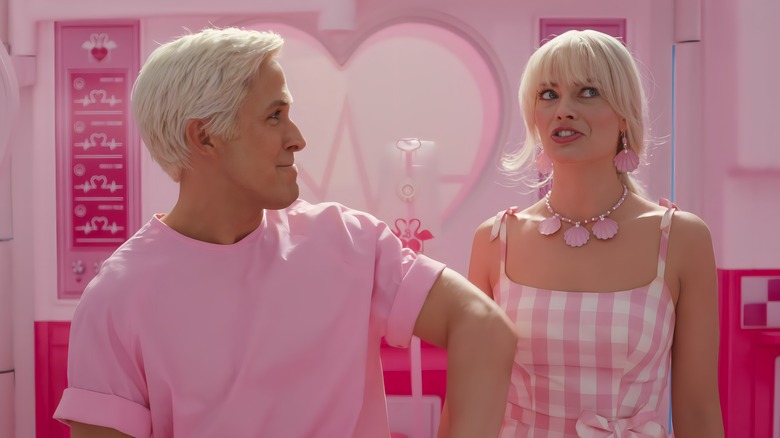Barbie & Plato: Did Fans Just Uncover The Deepest Barbieland Theory Yet?
There's no debating that Greta Gerwig's "Barbie" is a much smarter movie than we expected, but could it end up being taught in philosophy classes? A new fan theory suggests that "Barbie" covertly takes its premise from ancient Greek philosophy. Specifically, the theory claims Barbieland reflects Plato's concept of forms.
A bit of Intro to Ancient Philosophy will help clarify the concept of the Platonic form. According to Plato, there is an ideal, quintessential version of everything. We call these "Platonic ideals." However, a Platonic ideal can never exist in real life. Every car, for example, is a deviation from the Platonic ideal of a car. All trees are imperfect replicas of the Platonic idea of a tree. Et cetera. The closer something is to the Platonic ideal itself, the closer it is to truth.
So how does Platonic philosophy apply to "Barbie," of all things? Well, according to one fan post on Reddit, Barbieland is modeled as a reflection of Plato's ideals — the Realm of Forms. Reddit user u/aslfingerspell laid their theory out in a rather long post that read, in part, "The biggest piece of evidence for the Barbies being in the Realm of Forms is that despite the fact that some of them are representative of actual toys, there are no one-for-one duplicates. In Toy Story, it's possible for a Buzz Lightyear to meet another Buzz Lightyear, even if they all think they're the real one ... You don't have that in Barbie Land. Everyone in Barbie Land is a distinct, singular individual, even if countless thousands of their model of doll have been produced."
It's a fascinating theory, but does it hold true across the entire film, or is a life in plastic as meaningless as it seems on the surface?
It's hard to dispute a Platonic reading of Barbie
If the basic premise of the claim that the Barbieland of "Barbie" is based on Plato's writings doesn't sway you outright, that's fine. The aforementioned Redditor has compiled plenty of evidence to support it.
Notably, Platonic forms are eternal and unchanging, according to u/aslfingerspell. That goes a long way toward explaining why the many Barbies never age or experience things like cellulite in Barbieland. Additionally, Plato's forms are immaterial abstractions that cannot exist in the real world, hence the division between Barbieland and the real world. That immateriality also explains why nothing in Barbieland is real. Even the ocean is made of plastic. u/aslfingerspell continued, "Ken cannot actually do anything associated with Beach, because to actually swim would be an imperfect realization of the concept of Beach."
Other evidence includes how there is only one copy of each Barbie and Ken in Barbieland, which is important because Platonic forms are singular. There can only be one "most ideal" version of something or someone. And so, despite the fact that there are perhaps millions of Stereotypical Barbies being nostalgically played with in the real world, there's only one of her in Barbieland.
The theory's writer offers plenty more support for their claim, and the post is worth reading in full. We're going to mark this theory up as possibly true, mostly because it seems characteristic of Greta Gerwig and her writing partner Noah Baumbach to imbue everything they touch with deeper layers of meaning. Baumbach, in particular, is known to layer philosophy into his work. His writing credits include two Wes Anderson movies ("The Life Aquatic" and "Fantastic Mr. Fox"), and his most recent solo outing, an adaptation of the Don DeLillo novel, "White Noise," makes little sense until watched from a philosophical perspective.

